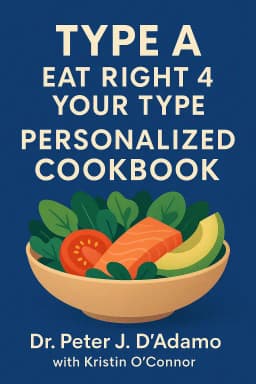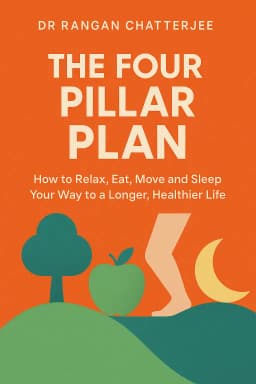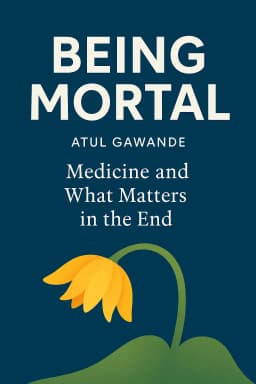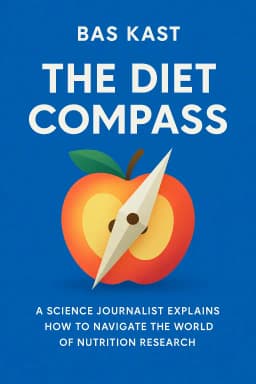
Personalized Podcast
Golden Hook & Introduction
SECTION
Orion: Imagine a cage full of rats. For years, they've eaten healthy, boring pellets. Then one day, you introduce them to a buffet of cheesecake, bacon, and Snickers bars. What happens next is not just shocking—it reveals the fundamental reason why our entire society is struggling with weight. And it has almost nothing to do with willpower.
eck: That’s a powerful image to start with. It immediately gets you thinking about what's really in control.
Orion: It’s the central question, isn't it? Welcome, everyone. Today, we're diving into Johann Hari's provocative book, 'Magic Pill,' to understand the Ozempic revolution that’s sweeping the world. And we're so glad to have you here, eck, especially with your interest in nutrition and the deeper stories behind our habits.
eck: Thanks for having me, Orion. This book feels like it’s at the intersection of everything that fascinates me: nutrition, motivation, and even history.
Orion: Perfectly put. And that’s how we’re going to approach this. Today we'll tackle this from two critical angles. First, we'll uncover the science of how our food was deliberately redesigned to make us overeat. Then, we'll look back at history's chilling warnings about 'miracle' weight-loss drugs to understand the stakes of our current moment.
Deep Dive into Core Topic 1: The Engineered Appetite
SECTION
Orion: So let's start with those rats. eck, as someone interested in nutrition, we're often told it's about making better choices. But this book argues the choice was made for us, long before we get to the supermarket, often in a factory.
eck: That’s the part that really hooked me. The idea that we’re playing a game that’s been rigged from the start.
Orion: Exactly. Hari tells this incredible story about a neuroscientist named Paul Kenny. In the early 2000s, Kenny, who is from Ireland, moved to San Diego and was just stunned by the American food environment. He wondered, does this diet of hyper-processed, high-sugar, high-fat food actually change your brain?
eck: So he decided to test it.
Orion: He did. He set up an experiment he called 'Cheesecake Park.' He took a group of lab rats and split them. One group got the standard, healthy-but-boring rat chow. The other group got access to a buffet of human junk food: cheesecake, bacon, sausages, Snickers bars.
eck: I can guess which buffet was more popular.
Orion: You have no idea. The rats with the junk food went wild. They started gorging themselves, eating way more calories than they needed. But here's where it gets disturbing. They quickly lost all interest in their healthy food. Even when it was their only option, they’d just… wait. They’d rather starve for a bit than eat the healthy stuff.
eck: Wow. So their brains had been completely rewired to crave the junk.
Orion: Completely. And this is the kicker. Kenny then added a small electric shock to the junk food. A warning signal. Historically, rats will immediately avoid something that causes them pain. But these rats? They hesitated for a moment, and then they took the shock just to get another bite of cheesecake. They became obese, lethargic, and sick. Kenny's conclusion was stark: this diet doesn't just add calories; it hijacks the brain's reward system in the same way drugs like cocaine do.
eck: That's fascinating and deeply unsettling. It reframes the entire conversation. We talk about 'motivation' to eat healthy, but if your brain's dopamine system is hijacked, as Kenny's research suggests, it's not a fair fight. It's like asking someone to be 'motivated' to walk a straight line while the floor is tilting beneath them.
Orion: That's a perfect analogy. Hari calls it the 'death of satiety'—satiety being that feeling of fullness. He quotes a food scientist who candidly admitted their job is to 'make something taste like something, even if it is not.' It's an illusion of food, designed to make you keep eating.
eck: And that connects to the historical aspect for me. This isn't an ancient problem. You look at historical figures you admire, like Ruth Bader Ginsburg or George Washington—their diets were completely different. They ate real food because that’s all there was. The book mentions obesity rates skyrocketing since the 1970s. That's not a sudden failure of global willpower; it's an environmental shift.
Orion: It’s a systemic, industrial problem. And that’s the trap. We’ve been put in a situation that makes us sick.
eck: And now, we’re being offered a pill to solve the sickness. Which sounds great, until you look at the history of these kinds of pills.
Deep Dive into Core Topic 2: History's Ghost
SECTION
Orion: And that is the perfect transition. That environmental shift created a massive problem, which in turn created a massive demand for a magic solution. But as you know from your interest in history, eck, the search for a 'magic pill' for weight loss has a very, very dark past. This brings us to our second point: history's chilling warning.
eck: I’m thinking of the saying, "Those who cannot remember the past are condemned to repeat it." It feels very relevant here.
Orion: Frighteningly so. Hari takes us back to the 1990s and the story of a drug combination called Fen-Phen. It was hailed as a miracle. It suppressed appetite brilliantly, and millions of prescriptions were written. It was on the cover of magazines. The ultimate magic pill.
eck: The same kind of hype we're seeing today with Ozempic.
Orion: The exact same hype. The book tells the story of a 29-year-old woman named Mary Linnen. She was happy, healthy, and about to get married. She just wanted to lose about 20 pounds before her wedding. Her doctor prescribed Fen-Phen. It worked, she lost the weight. But soon after, she started feeling breathless, just walking up a flight of stairs.
eck: Oh no.
Orion: Her doctors were baffled at first, but they eventually diagnosed her with primary pulmonary hypertension. It’s a rare condition where the arteries in your lungs narrow, forcing your heart to work incredibly hard just to pump blood. It’s incurable. Within a few years, Mary couldn't breathe without being hooked up to a giant oxygen tank, 24 hours a day. Her life was destroyed. She eventually died from the condition caused by the drug.
eck: Just to lose a few pounds for her wedding. That's heartbreaking.
Orion: It's a tragedy. And she wasn't alone. Thousands were harmed. The drug was eventually pulled from the market, and the manufacturer paid out over $12 billion in settlements—one of the largest in history. But here’s the part that gives you a cold chill. The book unearths an internal memo from one of the company administrators, written as the scandal was unfolding. He wrote, and I'm quoting here: "Can I look forward to my waning years signing checks for fat people who are a little afraid of some silly lung problem?"
eck: That quote is just... it’s evil. It shows the absolute disconnect between profit and human life. And it makes me so skeptical of the current Ozempic hype. The marketing feels eerily similar: 'This time it's different. This time it's safe.'
Orion: Hari makes that exact point. He argues there's a clear historical pattern. A new drug appears. It works. There's a period of mass euphoria. And then, sometimes years later, the fatal flaw is discovered. It happened with a drug called dinitrophenol in the 1930s that literally cooked people from the inside out. It happened with amphetamines in the 50s that caused psychosis.
eck: It's a historical cycle. And it makes you wonder, what are the 'unknown unknowns' with these new drugs? The book mentions the known potential risks—thyroid cancer, pancreatitis, stomach paralysis—but what about the things we won't know for another ten or twenty years? We're clearly in the 'euphoria' phase right now. History suggests we should be in the 'extreme caution' phase.
Orion: A very well-armed, very well-funded euphoria phase.
Synthesis & Takeaways
SECTION
Orion: So we're caught in this incredible paradox. On one hand, as the 'Cheesecake Park' experiment shows, we have an engineered food environment that is actively working against our health and our brains.
eck: And on the other hand, we have a potential chemical solution that history, through the tragic story of Fen-Phen, warns us to be incredibly wary of. It feels like a trap of our own making. We created the poison, and now we're selling a potential antidote that might also be a poison.
Orion: Exactly. The book doesn't give an easy answer, which is what makes it so valuable. It doesn't say 'take the drug' or 'don't take the drug.' It forces us to ask much better, much deeper questions.
eck: Right. And for me, the takeaway isn't about being for or against Ozempic. It's about shifting the focus of the question itself. We're so busy asking, 'How can I lose weight?' But maybe the better question, inspired by this book, is, 'What is one thing I can do today to reclaim my relationship with real food?'
Orion: I love that. It’s about agency.
eck: It is. It’s a small act of rebellion against this massive system that wants us to be sick and then just take the pill. It could be as simple as trying one new vegetable, or cooking one simple meal from scratch. It’s not about the weight, not at first. It’s about the practice of caring for your body in a world that makes it very hard to do so. That feels like a more powerful and sustainable form of motivation to me.
Orion: A small act of rebellion. That’s a perfect, powerful thought to end on. eck, thank you so much for these insights.
eck: Thank you, Orion. This was a fantastic conversation.









